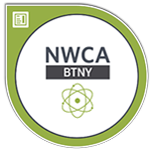PURPOSE
The Botany credential documents the essential competencies for entry-level botanists who study plant life. Botanists and their assistants must have an understanding of plant structure, function, and classification as well as how plants are impacted by humans and how humans can use plants and plant products.
AUDIENCE
This credential is appropriate for entry-level botanists and their assistants. Botanists study plant life, teach botany topics at various levels of education, and work in botanical gardens, arboretums, herbariums, zoos, medical plants, or germplasm resource laboratories. Botanists also work in biological supply houses, biotechnology firms, pharmaceutical companies, nurseries, greenhouses, and petrochemical companies. They may also work in botany-related publication, sales, or animal or plant health inspection services.
JOB/CAREER REQUIREMENTS
Entry-level botanists must have earned at least a bachelor’s degree. Higher-level botany professionals generally require a higher degree, such as a master’s degree or PhD Educational institutions higher botanists as teachers or researchers and their assistants. Botanists may specialize in plant anatomy, biochemistry, biophysics, cytology, ecology, genetics, molecular biology, morphology, paleobotany, plant physiology, systematic, systems ecology, or taxonomy. They may also work in fields such as agronomy, biotechnology, plant breeding, economic botany, food science and technology, forestry, horticulture, natural resource management, and plant pathology. Botanists may also specialize in the type of organism they study.
BOTANY WORKPLACE TASKS:
- Design and implement research studies on plants
- Write study reports on research findings
- Identify and categorize plants
- Study the effects of pollution, humans, and animals on plants
- Study the effects and uses of plants
- Study how plants are used by various cultures and people groups
- Study the interaction of plants and other organisms and the environment
- Manage plants and provide educational programs in botanical gardens, herbariums, arboretums, state and national parks, and forests
- Work in plant breeding laboratories
EXAM STRUCTURE OVERVIEW
Number of Questions in Exam: 135
Total Time: 100 minutes
Overall Passing Score: 70%
(All sections require an individual passing score of 70%)

